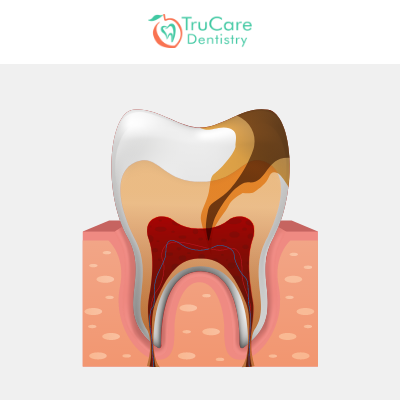
Enamel, dentin, tooth pulp, and cementum are four crucial layers of the tooth. You have probably heard about some of these from your dentist. And perhaps you have reached the blog to understand more about tooth pulp.
At TruCare Dentist in Roswell (GA), we have created this guide to assist you. Let’s explore the parts, functions, and problems that this innermost layer can face.
What’s tooth pulp?
Tooth pulp has a jelly-like appearance. It consists of large nerves, connective tissues, specialized cells, and blood vessels.
The enamel and dentin layer protects the tooth pulp. It remains safe in the hollow center part of the tooth. The area consists of the root canal and the pulp chamber.
Functions of tooth pulp
The tooth pulp is like every tooth’s soul. Any damage to the pulp results in loss of nerve and blood supply to the teeth. Here’s a look at some of its primary functions:
1. Sensing pain and temperature changes
The dental pulp is the only part of the tooth consisting of nerves and blood vessels. The nerves within the jelly-like layer can sense temperature changes, pressure, and damage to the dentin or the pulp itself.
2. Dentin production
Tooth pulp plays a crucial role in dentin production. It starts producing reparative dentin in case the tooth faces a trauma.
3. Keeping the teeth nourished and moisturized
The tooth will turn brittle if it does not get moisture. The pulp ensures your tooth receives the necessary nutrients like fibrinogen and albumin. It provides the essential moisture to the dentin and keeps it healthy. The tooth will turn brittle if it does not get moisture.
Trouble-Trouble: Signs that indicate issues with the tooth pulp
There are several pulp diseases, and symptoms may differ according to the severity. Some of the most common indicators of infection are sharp pain in the mouth after eating sweets or drinking hot and cold food items.
What conditions can affect tooth pulp?
1. Pulpitis
Pulpitis is an infection triggered by decay that can damage the tooth pulp. In severe neglect, the bacteria pass through the enamel and dentin to reach the pulp.
Besides decay, even tooth grinding or sudden injury can expose the pulp leading to infection.
You certainly wish to know if the condition is reversible with treatment. There are two types of pulpitis, the first is reversible, and the other is irreversible.
Both can increase sensitivity, inflammation and cause pain. Yet, there are other differences as well.
2. Reversible pulpitis
The condition is caused by decay. Patients experience mild pain while eating in case of reversible pulpitis.
The dentist removes the decayed portion and applies a calcium-based solution to heal the pulp as part of the treatment. Then, a pulp cap and dental filling are used for closing the tooth and restoring the chewing power. Your dentist will also prescribe antibiotics in case of infection.
3. Irreversible pulpitis
Yes, you guessed it right, it’s irreversible pulpitis. If the patient starts experiencing extreme pain, the chances are that the tooth pulp is dead. The inflammation reaches the point where only a pulpectomy can help save the tooth.
Your dentist will remove the pulp with root canal files and use sodium hypochlorite and water to clean the chamber. The pulp is replaced with other natural materials before closing the hole with dental fillings.
Depending on the severity of the case, your dental health professional might recommend a tooth extraction.
4. Pulp necrosis
It’s often considered stage two for pulpitis. If the patient ignores chronic pulpitis, the decay causes the death of the pulp. You won’t experience inflammation or pain associated with pulpitis as the nerve has already died.
The trouble starts when dental abscess symptoms appear. Pus starts accumulating inside the tooth. If left untreated, it can shift to other parts of the body. Yes, it turns into a life-threatening condition.
Dentists examine the damage and recommend a root canal or tooth extraction.
5. Dental pulp calcification
Lumps of calcium or stones start forming in the dental pulp. They often bind to dentin or float in the tooth pulp. Such stones usually develop in molar teeth.
Dental pulp calcification does not have any associated symptoms.
Patients in the 40 and above age group are more prone to this condition. Researchers have not been able to find the reason behind dental pulp calcification.
Unfortunately, your surgeon can diagnose it only during a root canal surgery. These stones complicate the procedure.
Is there any way to regrow the infected pulp tissue?
You certainly wish to know if scientists have developed a medicine that can support stem cell regrowth.
As per a report published by BBC, scientists in the UK have developed a medicine that triggers stem cells’ regrowth.
But, hey, hold the phone!! Researchers have tested and achieved success only in regrowing these cells inside mice. So, as of now, pulp regeneration is not available for patients in dental clinics.
Why worry? You can practice basic oral hygiene and protect your natural teeth.
Here’s a quick look at ways to help prevent tooth pulp concerns:
- Brush your teeth at least twice a day with a soft-bristled brush.
- Brush your teeth from all sides.
- Use a dental flosser once a day to ensure food parties do not remain stuck.
- If you are a chronic teeth grinder, use a mouthguard while sleeping.
- Do not skip annual dental check-ups and clearing sessions at the dental clinic.
To sum it up:
Your dental care expert will first take an X-ray to check how far the infection has reached. The professional will decide accordingly and choose between filling, root canal, or tooth extraction. They might prescribe vital antibacterial medicines to control infection if necessary.
Remember, don’t let reversible pulpitis turn into an irreversible one. Visit your local dental clinic asap for a check-up in case of pain in the teeth. If you are in Roswell (GA), visit TruCare Dentistry.
